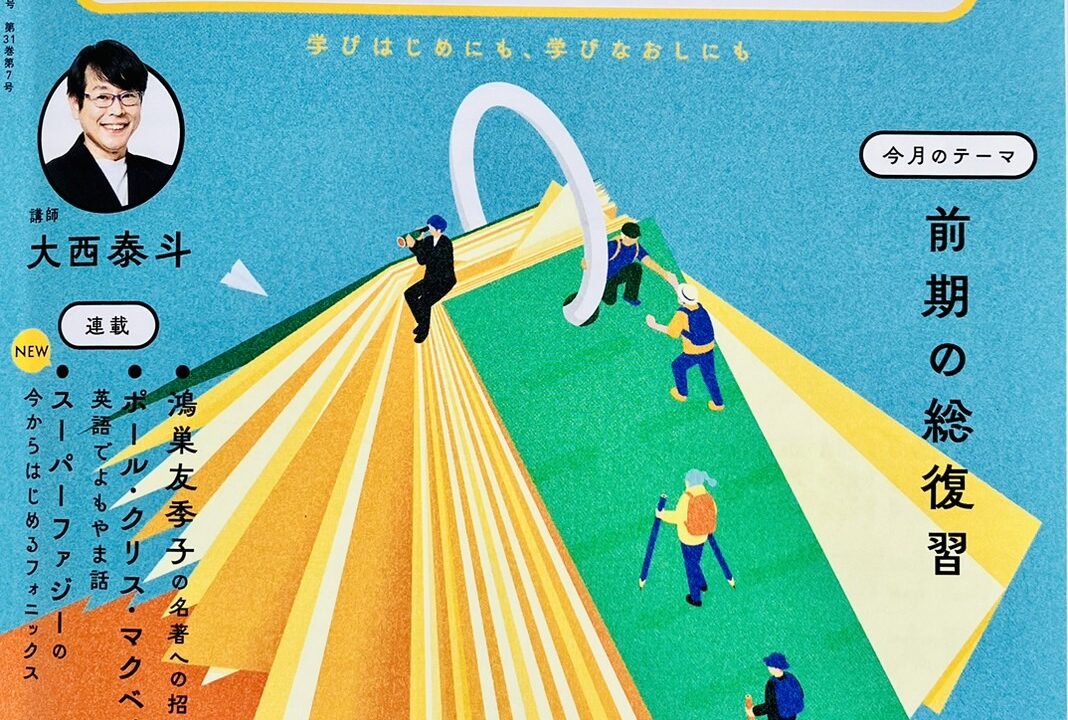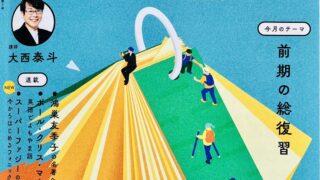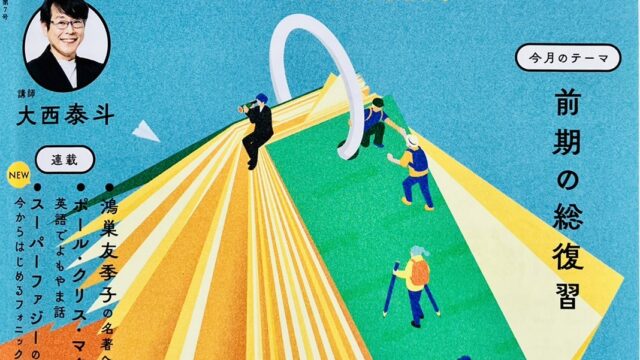【ラジオ英会話】Lesson 139 指定ルール 助動詞 – October 24/31 Thursday, 2024

October 24/31 Thursday, 2024
Lesson 139 指定ルール 助動詞
★Opening
R: And we are back! You are not going to believe our lesson today. This is Akino Roza.
D: And I’m David Evans. All right everyone! Let’s finish the month strong.
**finish the ~ strong:
☆Words & Phrases
And, we are back! I’m so excited. You’re not going to believe our guest today.
**be proud of ~:
Kohei, I’m so proud of what you’ve done for our city, and the world.
**inspiration:
And you’ve been an inspiration for millions of people.
**encouraging:
Thank you. That’s encouraging.
**legend:
Did you ever think you’d become a baseball legend?

**this:(副詞)
**prove:
Well, I never thought I’d become this big. It just proves anything can happen.

☆Grammar and Vocabulary
I’m so excited.
感情を表す動詞から派生した形容詞
excited は、感情を表す動詞 excite(興奮させる)の過去分詞から派生した形容詞。
過去分詞は「~される」の意味を持つため、excited は「興奮させられる→興奮して」と、人の感情を形容する。
exciting も excite から派生した形容詞だが、こちらは「興奮させるような」で、感情を引き起こす事物について形容する単語。しっかり区別を!
You’ve been an inspiration for millions of people.
現在完了形
現在完了形(have + 過去分詞)のイメージは「(今に)迫ってくる」
You’ve been an inspiration は「過去に励みだった」と言っているわけではない。今、人々の励みになっている、と現在に焦点がある文である。
過去から現在に視線がたどっている、それが現在完了形のニュアンス。

☆Target Forms
Anything can happen.
*修飾語 被修飾語で示しています
助動詞の最も重要な学習事項のひとつは、助動詞の織り成す複雑な意味・使い方がすべてひとつのイメージに連なっているのを理解すること
can のイメージは「潜在」、それが「やろうと思えばできる – 能力」、「そうした自由を持っている – 許可」などにつながるが、ここでは「~しうる・ときに~することもある」あらゆる事柄に、それが起こりうる「潜在的可能性」が秘められている、という使い方
※Anything can happen. の「修飾語」と「被修飾語」について
被修飾語: happen(動詞)
この文の動詞で「起こる」です
修飾語: can(助動詞)
動詞の happen を修飾して「起こりうる」つまり「可能性」を示しています
つまり、happen は「修飾される語=被修飾語」です!
Practice
助動詞の学習でもうひとつ大切なこと。それは語順。日本語では「~しうる」は文末ですが、英語では動詞の前。それは「指定ルール: 指定は前に置く」が働いているから。 「happen は事実ではなく can(しうる)の内容なのですよ」と指定するため、助動詞はこの位置に置かれるのです。動詞の前に助動詞を正しく置く – 日本語語順のくびきをまず断ち切らねばなりません。
Anything can
↓
Anything can happen.
① You can do it.
→「能力」の can
「潜在」から連なる使い方
② You can leave at any time.
You can borrow my car.
→ 相手に内在する自由を示す「許可」
「上から下」の may の許可よりはるかに気楽な表現
③ You can’t fly drones here.
→ You can’t は「許可しない=禁止」
単に「そうした自由がない」を意味するため、
must not の高圧的な禁止
may not の権威的な禁止
より、中立的で使いやすい表現
④ I will be able to finish this report by tomorrow.
→ 助動詞を2つ重ね、✖ will can finish ~ とすることはできない
「助動詞 + 助動詞相当のフレーズ」のコンビネーションは、be able to 関連だけでも
may be able to
must be able to
もある
★Practice
D: Okay everyone, practice time. Whoo! Today we’ll practice「助動詞」. Where do we put it? Placement is important. So let’s sandwich it, between the subject and the main verb. Okay? Let’s practice.
R: Let’s begin,
– You can do it.
D: Great work. Keep it up,
– You can leave at any time.
– You can borrow my car.
R: Now, in the next example, we are gonna use “can’t”. As opposed to “can”, pronounce that quite strongly, “can’t, you can’t”.
– You can’t fly drones here.
D: All right. And let’s wrap up with one more. Let’s treat “will be able to” like it’s one word,
– I will be able to finish this report by tomorrow.
D: Unlock your potential.
R: Repetition is the key!
D&R: Great work.
☆Grammar in Action
①この部屋はとても暑くなることがあります。もしそうなったら、ご自由にエアコンを使ってください。
**AC:
**feel free to ~:
②ペンのインクが切れたの?どうぞ。僕のを使っていいですよ。
**run out of ~:
③私たちはあとで休むことができますよ。今のところは、私たちは動き続ける必要があります。
**rest:
**for now:
★Ending
R: Great job everyone. Keeping up so far. We know you can do it.
D: How is your confidence? Is it building up little by little? I hope so!
October 24/31 Thursday, 2024
Lesson 139 指定ルール 助動詞
(日本語訳・解説付き)
★Opening
R: And we are back! You are not going to believe our lesson today. This is Akino Roza.
D: And I’m David Evans. All right everyone! Let’s finish the month strong.
**finish the ~ strong: 最後まで~を全力でやり遂げる、~を力強く締めくくる
☆Words & Phrases
And, we are back! I’m so excited. You’re not going to believe our guest today.
さぁ、始めましょう!私はとてもわくわくしています。皆さんも、今日のゲストがこの方だなんて信じられないでしょうね。
※be going to ~ は「流れの中→そういうことになるでしょう」です。なのでこの文は「信じられないでしょうね」となっています!
**be proud of ~: ~を誇りに思う
Kohei, I’m so proud of what you’ve done for our city, and the world.
コウヘイ、あなたが私たちの街と世界のためにしてくれていることをとても誇りに思います。
**inspiration: 刺激やひらめきを与えるもの、行動や創造のきっかけとなるもの
And you’ve been an inspiration for millions of people.
そして、あなたは何百万人もの人たちを勇気づけています。
**encouraging: 人を励ます、勇気づける
Thank you. That’s encouraging.
ありがとう。そう言ってもらえると、励みになります。
**legend: 超大物、伝説的人物
Did you ever think you’d become a baseball legend?
あなたはご自分が野球界の超大物選手になると思っていましたか?
※did you ever ~ は「(どの時点をとっても=ever)~することはありましたか?」です
※ちなみにこれが現在形の Do you ever ~ だと「~することはありますか?」となります。この↓レッスンに出てきました!

**this: こんなに
**prove: 証明する、示す
Well, I never thought I’d become this big. It just proves anything can happen.
いえ、自分がこんなに有名になるとは思ってもいませんでした。これは、何が起きても不思議ではないということを証明しているにすぎません。
※副詞で this「こんなに」ですが、that「そんなに」も以前のレッスンで出てきました↓

☆Grammar and Vocabulary
I’m so excited.
私は、とてもわくわくしています。
感情を表す動詞から派生した形容詞
excited は、感情を表す動詞 excite(興奮させる)の過去分詞から派生した形容詞。
過去分詞は「~される」の意味を持つため、excited は「興奮させられる→興奮して」と、人の感情を形容する。
exciting も excite から派生した形容詞だが、こちらは「興奮させるような」で、感情を引き起こす事物について形容する単語。しっかり区別を!
You’ve been an inspiration for millions of people.
あなたは、何百万人もの人たちの励みになってきました。
現在完了形
現在完了形(have + 過去分詞)のイメージは「(今に)迫ってくる」
You’ve been an inspiration は「過去に励みだった」と言っているわけではない。今、人々の励みになっている、と現在に焦点がある文である。
過去から現在に視線がたどっている、それが現在完了形のニュアンス。

☆Target Forms
Anything can happen.
何でも起こりえます。
*修飾語 被修飾語で示しています
助動詞の最も重要な学習事項のひとつは、助動詞の織り成す複雑な意味・使い方がすべてひとつのイメージに連なっているのを理解すること
can のイメージは「潜在」、それが「やろうと思えばできる – 能力」、「そうした自由を持っている – 許可」などにつながるが、ここでは「~しうる・ときに~することもある」あらゆる事柄に、それが起こりうる「潜在的可能性」が秘められている、という使い方
※Anything can happen. の「修飾語」と「被修飾語」について
被修飾語: happen(動詞)
この文の動詞で「起こる」です
修飾語: can(助動詞)
動詞の happen を修飾して「起こりうる」つまり「可能性」を示しています
つまり、happen は「修飾される語=被修飾語」です!
Practice
助動詞の学習でもうひとつ大切なこと。それは語順。日本語では「~しうる」は文末ですが、英語では動詞の前。それは「指定ルール: 指定は前に置く」が働いているから。 「happen は事実ではなく can(しうる)の内容なのですよ」と指定するため、助動詞はこの位置に置かれるのです。動詞の前に助動詞を正しく置く – 日本語語順のくびきをまず断ち切らねばなりません。
Anything can
↓
Anything can happen.
① You can do it.
あなたならそれができます。
→「能力」の can
「潜在」から連なる使い方
② You can leave at any time.
いつでも出発してもいいですよ。
You can borrow my car.
私の車を借りてもいいですよ。
→ 相手に内在する自由を示す「許可」
「上から下」の may の許可よりはるかに気楽な表現
③ You can’t fly drones here.
あなたはここでドローンを飛ばしてはいけません。
→ You can’t は「許可しない=禁止」
単に「そうした自由がない」を意味するため、
must not の高圧的な禁止
may not の権威的な禁止
より、中立的で使いやすい表現
④ I will be able to finish this report by tomorrow.
私はこのリポートを明日までに終えることができますよ。
→ 助動詞を2つ重ね、✖ will can finish ~ とすることはできない
「助動詞 + 助動詞相当のフレーズ」のコンビネーションは、be able to 関連だけでも
may be able to(できるかもしれません)
must be able to(できるにちがいありません)
もある
★Practice
D: Okay everyone, practice time. Whoo! Today we’ll practice「助動詞」. Where do we put it? Placement is important. So let’s sandwich it, between the subject and the main verb. Okay? Let’s practice.
R: Let’s begin,
– You can do it.
D: Great work. Keep it up,
– You can leave at any time.
– You can borrow my car.
R: Now, in the next example, we are gonna use “can’t”. As opposed to “can”, pronounce that quite strongly, “can’t, you can’t”.
– You can’t fly drones here.
D: All right. And let’s wrap up with one more. Let’s treat “will be able to” like it’s one word,
– I will be able to finish this report by tomorrow.
D: Unlock your potential.
R: Repetition is the key!
D&R: Great work.
☆Grammar in Action
①この部屋はとても暑くなることがあります。もしそうなったら、ご自由にエアコンを使ってください。
This room can get really hot. If it does, feel free to use the AC.
**AC: エアコン
**feel free to ~: 自由に~する
②ペンのインクが切れたの?どうぞ。僕のを使っていいですよ。
Did your pen run out of ink? Here. You can use mine.
**run out of ~: ~を使い果たす・切らす
③私たちはあとで休むことができますよ。今のところは、私たちは動き続ける必要があります。
We’ll be able to rest later. For now, we need to keep moving.
**rest: 休む
**for now: 今のところは・しばらくは
★Ending
R: Great job everyone. Keeping up so far. We know you can do it.
D: How is your confidence? Is it building up little by little? I hope so!
【AI×英会話】名古屋BEGビジネス英会話ジム – AIで鍛えるビジネスで使える英語力。仕事も日常も、一歩先へ。
営業時間:平日 9:00~22:00 土曜日 9:00~19:00(日祝休み)
〒450-0002 愛知県名古屋市中村区名駅2丁目40-16 名駅野村ビル 5階


